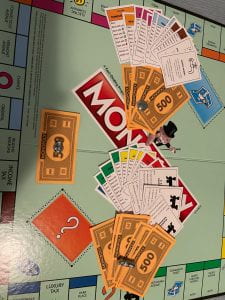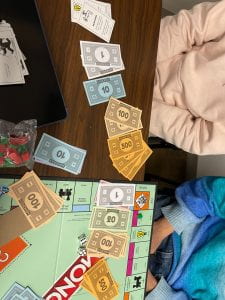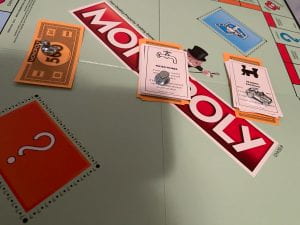


Game rule/modification on Monopoly:
Start of the game, the three players play rock paper scissors to determine the role of upper class, middle class and lower class.
- Lower class starts with $500 Cash and no property
- Middle class starts with $2500 Cash, both water and electric companies and properties from Valtic Ave all the way to New York Ave.
- Upper class starts with $5000 Cash, all the Railroads and properties from Kentucky Ave to Boardwalk.
Upper class moves first, followed by middle class and lower class. The opportunity and chest blocks are just blank spaces.
When stepping onto the tax block, the upper class will have to pay double, the middle class pays the same amount, and the lower class do not have to pay.
During their turn, the players can choose to donate to other players, there is a $1000 donation cap. Only half of the donation will be able to go through, the other half goes to the bank.
When facing a big amount of rent the lower class can choose to go to jail to avoid rent.
Passing through the starting square means going over one generation, the players will gain ⅕ of their total savings.
The game ends when one of the players goes bankrupt or the leading player is two generations ahead of the last player.
Artist Statement: As Dada started as an anti-war movement, many of the artworks during this period are created to protest against social issues. My project took inspiration from Yoko Ono’s White Chess in which she modifies the traditional game chess to make it more similar to actual warfare where there is no clear distinction between friendlies and enemies. After learning about the Dada movement and Yoko Uno’s piece, I want to create something that reflects contemporary social issues: class conflicts and the poverty cycle. Using the existing game Monopoly, I was able to modify it to make it simulate the actual economic situation of upper class, middle class and lower class. In the hope to evoke the players’ strong emotion towards the unfair social phenomena of the poverty cycle.
